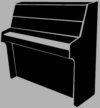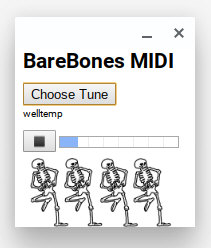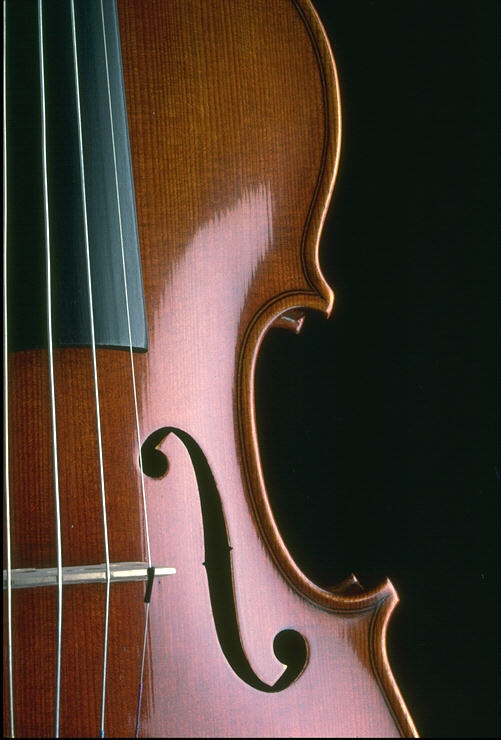 Music:
come wash over my soul.
Music:
come wash over my soul.
 Music:
come wash over my soul.
Music:
come wash over my soul.
* Having that feeling of there being a core identity
within --which resonates when "true notes" are struck, is my only qualification
for composing this page. Musical illiterate that I am, show me a better
version of these messages (or what should be in these messages) and I'll
simply redirect those who land here.
![]()
3/31/2024 update: My dear first wife called my attention
to a forthcoming book by Sheryl Kaskowitz (a music Ph.D.). It promises
to be on-target for the thrust of this web page (social coherency through
shared music) and an apt answer to my (above) request.
10/26/2024: * It turns out that Kaskowitz's book is about one of FDR's programs (during the great depression) in support of the arts --and toward the goal of lifting and uniting the nation's spirits --so laudable and applicable to my purposes here. "A Chance To Harmonize" Googles well.
* I'm returning to this web page to note the advent of music being generated by artificial intelligence and to suggest that, while artists' goals might be prowess, patronage and profits, the purpose of --our shared-- music is to stir us within, however it might be "generated"/composed and rendered. Digitally created music pieces (humanly or algorithmically/AI composed) won't necessarily be playable with traditional (manual) instruments, but could still elicit spiritual resonance.
I suspect that the further development of digitally created music will obviate my humble efforts to design a more rational and playable keyboard, while amply exploring all the new music (and more) that awaits us in a range of innovative keyboards.
Enough ---from me.
![]()
Meanwhile, I'll do my best to advance these simple
and obvious thoughts.
10/7/2017: E-friend David sent me a link --to a YouTube video of Bobby McFerrin at some kind of a conference, under the banner: "Finding a Common Chorus". (For more about this video's featured pentatonic scale:
> https://en.wikipedia.org/wiki/Pentatonic_scale
Also, see Bobby McFerrin and Joey Blake's vocal improvisations
at:
> https://www.youtube.com/watch?v=6rsUD1qBCrk&t=89
11/6/2019: Earlier this year the New York Times ran an opinion piece by Greg Milner: "They Really Don't Make Music Like They Used To". For plenty of opinion on that title/statement, see here. , where a Mr. John Donahue posted a JPEG image list of his top favorites. I've reproduced his top 8 here as text, easier to copy, paste and search.
* I've Got a Crush On You (Gershwins, 1930)
* Isn't
It Romantic? (Rodgers and Hart, 1932)
* I've Got You Under My Skin (Cole Porter, 1936)
* My Funny Valentine (Rodgers and Hart, 1937)
* If I Didn't Care, (Jack Lawrence, 1939)
* When I Fall In Love (Young and Heyman, 1952)
* Just
In Time (Jule Styne, 1956)
![]()
5/18/2019: Jon Brantingham 's web
site explaining the structure and vernacular of composition --so very
much anchored in tradition, is (IMHO) excellent. This subject is so dense
as to numb the mind and defeat one's enthusiasm for creating and exploring
music. It needs all the considerable skills that Jon can muster. (I've
more to say
here.)
![]()
* My message is hard to state without the assumption
that we're on the same page about many issues and aesthetics --or the implication
that "something's wrong with you" if we're not --but --well: there you
have it :-) --and we should take it as a welcoming compliment
when others want us to be "on the same page" with them (provided they don't
try to lop your head off if you decline the honor).
* One's affinity for music in general indicates something about openness, receptivity, and the development of our mental capacity to "hear"/relate to the measures and progressions of tones in a given genre. It's reasonable to assume that this phenomenon works both ways, as we grow "an ear" for music. On this page I'm suggesting that music could be used to both select and rally segments of society toward civic/"political" purposes --at the least. (Politics usually implies impersonal manipulation, especially of one class by another. My intention here is more about drawing others in --to a sense of interpersonal "intentional community" and culture.)
* That music is/could be central to the well being
of society is an ancient idea.
![]()
** I've become aware of serious,
lab based research on our responses and responsiveness to music --which
Madison Avenue and political consulting agencies will (surely) competitively
seize upon in order to spruce up their offerings. I'd rather see socially-spiritually
motivated folks getting to it first.
https://www.sciencedaily.com/releases/2017/09/170905093821.htm
https://www.washingtonpost.com/graphics/2017/lifestyle/your-brain-on-art/?deferJs=true&hpid=hp_rhp-
more-top-stories_sa-kaufman-1218pm%3Ahomepage%2Fstory&outputType=default-article&utm_term=.14f079c61a90
https://academic.oup.com/scan/article/11/6/884/2223400/Brain-connectivity-reflects-human-aesthetic
(Best Google on: "Brain connectivity reflects human aesthetic responses
to music" and look for popular presentation/commentary on this 2016 work
by Sachs, Ellis and others. Their formal article in this journal: "Social
Cognitive and Affective Neuroscience" is laden with technical jargon.)
![]()
* Anyone who's read this far has probably read about
one of the many studies which exposed adults, children, the unborn/in utero,
even many varieties of garden plants and commercial crops (corn and soy)
to various types of music --or simply steady tones of various pitches.
The latter results have been so dramatic that I fear we'll soon be assaulted
by various flavors of tunes and noise as we drive by greenhouses and farmers'
fields.
I mention these studies because we are all closely related in the DNA/RNA web of life, and this might be a way to get around our culturally learned prejudices about what's "good" and "bad" music --long enough to appreciate the type/s of music which best resonate with our "souls". I suspect it will be simpler sounds which mimic, embellish, depict and build upon the sounds of Nature.
Have you ever noticed how actually loud a night can
be --when you're nestled into a cabin or tent near a lake or water way?
Yet: that "soundscape" is so buoyant and restful (except, perhaps, for
a bird's eager, early morning wake-up calls.)
![]()
* Just below are two beautifully staged examples from
a motion picture:
The Color Purple. The first one captures the coherency,
through song and rhythm, of a work gang. The second one (and I hope you're
open to it) might leave you smitten^. It's about coming home --to one's
people/community.
^ I'm a spiritual humanist and have twice been a Christian. I've put much effort into realizing intentional community. On several occasions I experienced the emotionally riveting effect of believing that I had achieved fellowship and community --or even just thinking it was at hand.
* https://www.youtube.com/watch?v=025QQwTwzdU (skip the commercial)
* https://www.youtube.com/watch?v=lD5uPZzBr5c
(skip the commercial)
--Please let go of any "secular" identity
for the moment. Recall your roots. Give yourself permission to feel this
one.
* I'll add a 3rd example: the wedding
scene from The Fiddler On the Roof .
![]()
* I've linked ![]() 25pieces
of music below which call to me and, hopefully, to you as well. My wife
and I gathered at least a thousand appealing Midi music files over the
years and narrowed them down to our favorites, from which I found it hard
to select just these 25.
25pieces
of music below which call to me and, hopefully, to you as well. My wife
and I gathered at least a thousand appealing Midi music files over the
years and narrowed them down to our favorites, from which I found it hard
to select just these 25.
Of course(!) there's a vast amount of great music that we failed to even consider. (Almost anything by the "Mamas and the Papas" could be included below.)
* Then I found as many corresponding YouTube versions as I could, but some sounded better in our old Midi versions (those blue boxed notes) --depending on which player application is used (start with Windows Media Player if you have a PC).
** An essential aspect of music for many of us are its circumstances --the performance setting --the social environment. While I enjoy watching/hearing a lavish concert production via DVD, I'd never care to join the thousands of people I see packed in on their folding chairs at concerts. In long video shots they look like hoards of ants. Give me a pause button, my own kitchen and my own bathroom!
I don't know what globe trotting operations like Andre Rieu's concerts charge, but I see that our local country music festival tickets go for about $150 ($300 to camp out on their event's grounds). For that you might get a folding chair, waiting in line at the nearest port-a-john, and a small fraction of the sound quality and concert over-view that a DVD of the event would provide --even if you sprang for VIP seating.
* Over the past 15 years I've had three memorable "public music" experiences. One was outside a department store just before Christmas. A fellow who I took to be a Salvation Army volunteer/irregular musician had quite wandered away from the official S.A. play list. Gosh: what smooth sweet sounds came out of his saxophone!
The second experience was strange. It took place at a local hospice 2nd hand goods store. A bewiskered old fellow who we often saw walking around, sat himself down at one of the store's pianos. He started right in, rolling off one standard after another: smooth arrangements with invisible transitions between --something you'd expect to pay a cover charge to hear at a piano bar. He outlasted the time I could stay and take in his keyboard mastery. Years later I learned that he owned that piano. He'd saved up to buy it, then asked if he could just keep his piano where it sat, since he had no place to put it.
The third experience took place in our city's "Mingus
Park" with its huge pond, water fowl and fountain. The talented harpist
Carol Ann set up and played classics on her delightful concert sized instrument
(named "Jubal"). The music and the setting all fell into place on a beautiful
summer day, during which my amateur efforts to video tape it all, including
the park environment and its happy people --somehow ended up looking and
sounding almost professional (much credit to my Canon video camera). We
turned out many DVD copies (giving them all away on request). This show
ran for 2 years on our local public access cable channel.
![]()
* Once upon a time, singing and the instrumental playing
of music was very much a cross-generational social currency of a community's
culture. Most households had some kind of an instrument and someone in
the family who could play it. Upright pianos were to be found even in hardscrabble
homes. Like a set of encyclopedias and a basket of stereoscopic view cards,
they were at least a salute toward an acquaintance with the arts, literature,
history and science.
 *
But far more than just being symbolic, music making and instruments were
an organic part of our lives. People sang and whistled while at chores
(remembering my mother), family and community gatherings would join in
to render familiar songs --perhaps soberly, perhaps loosened up with beers
and booze. Many families had members who played in a band of some kind
--to be found not just in schools and would-be commercial ventures, but
made up from the employees and volunteers of fire stations, larger retail
stores, and with municipal sponsorship.
*
But far more than just being symbolic, music making and instruments were
an organic part of our lives. People sang and whistled while at chores
(remembering my mother), family and community gatherings would join in
to render familiar songs --perhaps soberly, perhaps loosened up with beers
and booze. Many families had members who played in a band of some kind
--to be found not just in schools and would-be commercial ventures, but
made up from the employees and volunteers of fire stations, larger retail
stores, and with municipal sponsorship.
That's not all gone, of course, but we've largely allowed our digital/electronic devices, commercialization, greed heads and copyright vultures to purloin such natural expressions. Sadly, it might be the artists themselves (perhaps at the behest of their recording label masters) who zealously stamp out spontaneous public renderings of their compositions.
* Creative Commons shines through this darkness at:
> https://creativecommons.org/about/program-areas/arts-culture/arts-culture-resources/music-communities/
I'm slowly crawling the offerings there (40 down,
thousands to go). If I ever manage to create a decent piece of music (that
doesn't "infringe"), I'd certainly park a copy with CC.
* Grass roots political efforts were accompanied with motivational, engaging, synchronizing, music --new theme songs and familiar sing-alongs. From Nazis to the Salvation Army, cohesion was found through stirring popular music. --And speaking of the Nazis, and to quote Salvation Army founder William Booth: "why should the Devil have all the good music?".
* Yes: the culture and politics of "the 60s" had a lot to do with its music --and I'm thinking of Lennon's "Imagine", its affective ideas and spirituality --an anthem for many of us and a good example of the power of music toward social change and coherency. It was not, however, part of an "adult", organized, political and spiritual effort. (The "counter culture" commonly spurned organization and categorical thinking.) Nor do I want to suggest that "change" is a good thing for its own sake. At best, it's a "necessary evil". (In actuality, of course, 60s music was more in the nature of being a large body of copyrighted, marketed, hot commercial properties --same as always.)
It's possible (I think) for social/progressive change music to propagate among and engage people --even as intellectual properties --but we're all (all of us in "the movement") --brought up short when reminded of the profits being made --and then later when we see an old favorite used to sell consumer goods or get spiked by lawyers.
Many 60s "movement" people listened to their inspirational
music rather hypnotically, melding with it and seeking messages. With a
base of support like that, with sincere, coherent leadership, with a minimum
of mindless adolescent rebellion/fad, identity distractions, without commercial
exploitation (if/as possible) and keeping America's centuries old culture
of inebriation in the background --a "cultural revolution" could become
a positive and pivotal event --hopefully without getting co-opted by moneyed
interests or frightening cultural conservatives.
![]()
* An interesting (if not a "good") place to look for
talent on tap --and for a finger on the public's pulse/appetites is (of
course) the TV and other video ends of the advertising industry --musically
and visually. (Sadly,
radio commercials and play
lists --which
should shine, are typically poor to pathetic and annoying.)
When Anheuser-Busch's compelling music plays,
when their Clydesdales pull the old Budweiser beer wagon around Busch field
in St. Louis --oh my. (Yes: love those earnest looking gaited horses, but
I'm also remembering a "Make-a-Wish" cancer victim boy who got to ride
with the drivers and their Dalmatian).
 *
Prediction: a political movement will claim the legacy
of motivational music, then march, dance, waltz, mosey and/or shimmy
through the streets --with welcome and gladly given parade permits, to
rapidly coral a great following into its thrall.
*
Prediction: a political movement will claim the legacy
of motivational music, then march, dance, waltz, mosey and/or shimmy
through the streets --with welcome and gladly given parade permits, to
rapidly coral a great following into its thrall.
So: who's it gonna be?
* Public domain (published before 1923) and new compositions
placed directly into the public domain would liberate a movement's music
so that it can be played, sung and celebrated by everyone --vastly amplifying
and probably immortalizing a movement and its efforts. (But hey: the music
and lyrics have to be good --inspired, inspirational, sexy --would-have-been
valuable commercial properties.) (Song writers: please resist selling your
children into 100+ years of indentured servitude.)
![]()
 *
At first glance this strikes me as more than an "idea whose time has come".
It's latent "zeitgeist" and low hanging fruit. The souls of the people
have long hungered^ to be filled and renewed. Instead
we've gotten decades of mostly shabby, disingenuous leadership --culminating
in our recent presidential (hold-your-nose) election (unless you voted
for Bernie or Jill) --and lotsa crappy new music to wash it down with.
*
At first glance this strikes me as more than an "idea whose time has come".
It's latent "zeitgeist" and low hanging fruit. The souls of the people
have long hungered^ to be filled and renewed. Instead
we've gotten decades of mostly shabby, disingenuous leadership --culminating
in our recent presidential (hold-your-nose) election (unless you voted
for Bernie or Jill) --and lotsa crappy new music to wash it down with.
{E-friend Jerry points out that loosely licensed (CC) or public domain music can easily be commendeered by the political opposition. A more sophisticated approach (copyrighted but in the public interest) is indicated.
We need a new "bandwagon".
![]()

there are two personas per individual to persuade and we need to "talk" to both of them. At present (IMHO, and except for Madison Avenue productions), our considered "progressive" communications are mostly dry rational messaging, while our emotional engagement defaults to such as poorly managed social nuance, "style statements", the wandering creativity of composing/performing musicians and other artists.
* I think we can mostly agree that the task of "putting something over" (culturally/politically) benefits from emotional engagement.
As an old advocate for "intentional community", I'm
suggesting something purposeful, accountable and destination oriented --for
the "groovy" portions of our social discourse. That's still going to be
pretty vague in practice, but we can at least be clear about our musical
and other intents: to be engaging, uplifting, inspiring, caring, beautiful,
erotic, and/or wondrous. People want/crave "romance" (broadest sense).
![]()
** Right: This page and its sentiments about music
have little to do with 99% of what's marketed as music, especially to youth
--and the prospects for a grass roots resurgence of "proper" and "appealing"
music are poor because most people (seemingly) have no "receptors" or discernment
for it. They instead look to a musical product's fashionability
and style statement potential.
(Sorry: I simply don't dig long, drawn out formal music and opera --even at the more comfortable distance of a CD, DVD or LP record --unless it's the abbreviated highlights kind that someone like Andre Rieu presents, or maybe something like a "The Three Tenors" event. It's my suspicion that dress-up attendance at formal performances of classical works are largely due to "see and be seen" feelings of fashion and social obligation. One applauds like a trained seal and (at long last): "thank God it's finally over" --but no: "Oh shit: another curtain call" --and yet another standing ovation.)
* With today's options and comes-withs, you might have to install a Midi player on your computer or hand-held device. After that, you might end up first downloading these Midis when you click on them, then having to find where they went so you can click on them again.
The Chromebook Web Store offers a free "Midi Player and the "BareBones Midi" player --and thanks to "Spich" for offering it. Since this screen capture was posted, my copy of BareBones was (automatically, it seems) upgraded to display minutes and seconds on a functional progress bar.

Here then, and in no special order or groupings, are some of my favorites. Most of them should sound familiar. (All of the following links were good as of 10/10/2021.)
![]() Take
the A Train (Duke Ellington)
Take
the A Train (Duke Ellington)
![]() Star
Dust (Composed by Hoagy Carmichael)
Star
Dust (Composed by Hoagy Carmichael)
![]() String
of Pearls (Bobby Hackett with the Glen Miller Orchestra)
String
of Pearls (Bobby Hackett with the Glen Miller Orchestra)
![]() Wimoweh
(or: "The Lyon Sleeps Tonight"). However gussied up, it's the real deal,
having an 80+ year history starting with Zulu speaking composer/singer
Solomon Linda in the 1920s, from whom the copyright was transgressed --by
Pete Seeger's publisher. This linked version was revised by a talented
crew and rendered by "The Tokens" in 1961. Read the Wikipedia account at:
https://en.wikipedia.org/wiki/The_Lion_Sleeps_Tonight.
Wimoweh
(or: "The Lyon Sleeps Tonight"). However gussied up, it's the real deal,
having an 80+ year history starting with Zulu speaking composer/singer
Solomon Linda in the 1920s, from whom the copyright was transgressed --by
Pete Seeger's publisher. This linked version was revised by a talented
crew and rendered by "The Tokens" in 1961. Read the Wikipedia account at:
https://en.wikipedia.org/wiki/The_Lion_Sleeps_Tonight.
![]() I
Saw the Sign (Swedish band "Ace of Base". I don't care for the lyrics,
thus this instrumental/Midi.)
I
Saw the Sign (Swedish band "Ace of Base". I don't care for the lyrics,
thus this instrumental/Midi.)
![]() Wakko's
Two Note Song seems most appealing as a Midi. It has something to do with
installment #82 of a long running 1990s animated cartoon series --which
I'd not previously heard of. The cartoons are retro in theme and some top
drawer talent must be involved. (Did I see mention of Spielberg?) Nearly
all active links to it on the Web have a pay wall and there are several
web pages with notice that this music had to be removed.
Wakko's
Two Note Song seems most appealing as a Midi. It has something to do with
installment #82 of a long running 1990s animated cartoon series --which
I'd not previously heard of. The cartoons are retro in theme and some top
drawer talent must be involved. (Did I see mention of Spielberg?) Nearly
all active links to it on the Web have a pay wall and there are several
web pages with notice that this music had to be removed.
![]()
![]() Song
of India (Adapted and popularized from Rimsky-Korsakov's 1896 opera: "Sadko".
Tommy Dorsey made it and his band famous in 1937.)
Song
of India (Adapted and popularized from Rimsky-Korsakov's 1896 opera: "Sadko".
Tommy Dorsey made it and his band famous in 1937.)
![]() Good
Vibrations (Thanks largely to the Beach Boys' Brian Wilson)
Good
Vibrations (Thanks largely to the Beach Boys' Brian Wilson)
![]()
![]()
![]() Hesitation
Waltz, and I prefer the (first linked) innocent sounding Midi version.
Are those on-line links even the same tune? If properly identified here,
this piece comes to us from the pre WW-I "dance craze" period.
Hesitation
Waltz, and I prefer the (first linked) innocent sounding Midi version.
Are those on-line links even the same tune? If properly identified here,
this piece comes to us from the pre WW-I "dance craze" period.
![]()
![]() Well-Tempered
Clavier (J. S. Bach). I like both the (first linked) Midi and the interesting
YouTube organ rendition. (I think we're watching and listening to a computerized
musical notation scanner.) The title actually refers to a collection of
24 preludes and fugues, said to be the most seminally important pieces
in the development of western classical music. I understand this to be
advanced student fingering exercises. I've but a slight comprehension of
his musical structures ---but I join the crowd who loves Bach. (When playing
the midi version with "BareBones Midi", expect surprises :-)
Well-Tempered
Clavier (J. S. Bach). I like both the (first linked) Midi and the interesting
YouTube organ rendition. (I think we're watching and listening to a computerized
musical notation scanner.) The title actually refers to a collection of
24 preludes and fugues, said to be the most seminally important pieces
in the development of western classical music. I understand this to be
advanced student fingering exercises. I've but a slight comprehension of
his musical structures ---but I join the crowd who loves Bach. (When playing
the midi version with "BareBones Midi", expect surprises :-)
![]()
![]() Here's
another Bach selection, and you definitely want the out-linked version,
lovingly played by Yo-Yo Ma: Cello Suite #1 Prelude.
Here's
another Bach selection, and you definitely want the out-linked version,
lovingly played by Yo-Yo Ma: Cello Suite #1 Prelude.
![]() Stranger
On the Shore (First performed by a group under Acker Bilk in 1961. This
was extremely successful popular music.^)
Stranger
On the Shore (First performed by a group under Acker Bilk in 1961. This
was extremely successful popular music.^)
![]() Gotham
City Municipal Swing Band (Neal Hefti) --oh my.
Gotham
City Municipal Swing Band (Neal Hefti) --oh my.
![]() I'd Like To Teach the World To Sing (The Hillside Singers - 1972 - The
Shaw Brothers: Rick and Ron)
I'd Like To Teach the World To Sing (The Hillside Singers - 1972 - The
Shaw Brothers: Rick and Ron)
![]()
![]() Fur
Elise by Beethoven. The first link is a Midi version. This piece was actually
composed in honor of another woman, but Beethoven's handwriting was so
bad that [oh dear!] the publisher misread his dedication note on
the manuscript. (Neither "BareBones" nor Chromebook Midi Player will play
this one.)
Fur
Elise by Beethoven. The first link is a Midi version. This piece was actually
composed in honor of another woman, but Beethoven's handwriting was so
bad that [oh dear!] the publisher misread his dedication note on
the manuscript. (Neither "BareBones" nor Chromebook Midi Player will play
this one.)
![]()
![]() Song
To the Evening Star (from Wagner's Tannhauser)
Song
To the Evening Star (from Wagner's Tannhauser)
![]() Free
As A Bird (Created and sung by John Lennon in 1977, but instrumentally
augmented by the remaining three Beatles for release in 1995 --15 years
after Lennon's assassination.)
Free
As A Bird (Created and sung by John Lennon in 1977, but instrumentally
augmented by the remaining three Beatles for release in 1995 --15 years
after Lennon's assassination.)
![]() Working
in the Coal Mine (Music and lyrics by Allen Toussaint, as sung by Lee Dorsey
in 1966.)
Working
in the Coal Mine (Music and lyrics by Allen Toussaint, as sung by Lee Dorsey
in 1966.)
![]() I Get Around (Thanks largely to the Beach Boys' Brian Wilson)
I Get Around (Thanks largely to the Beach Boys' Brian Wilson)
![]() Carillon
(A delightful Midi in music box style, but I know nothing about it. There
are plenty of actual music box pieces to be found if you Google search
for them as videos.)
Carillon
(A delightful Midi in music box style, but I know nothing about it. There
are plenty of actual music box pieces to be found if you Google search
for them as videos.)
![]()
![]() Little
Fugue in G Minor (J. S. Bach - BWV-578 {I think}. The first link is a Midi.)
Little
Fugue in G Minor (J. S. Bach - BWV-578 {I think}. The first link is a Midi.)
![]()
![]() Perfidia
(Glen Miller --plus Nat King Cole and Julie London --for those who like
the lyrics)
Perfidia
(Glen Miller --plus Nat King Cole and Julie London --for those who like
the lyrics)
![]()
![]()
![]() Nola
- The 3rd link is a midi. The 2nd takes you to a 1922 version of Felix
Arndt's composition, which was a gift to his lover and future wife Nola
Locke. It began the "novelty ragtime" genre and became a Les Paul hit in
1950. Arndt only lived to 29 years of age, but he cut over 3000 piano rolls.
Nola
- The 3rd link is a midi. The 2nd takes you to a 1922 version of Felix
Arndt's composition, which was a gift to his lover and future wife Nola
Locke. It began the "novelty ragtime" genre and became a Les Paul hit in
1950. Arndt only lived to 29 years of age, but he cut over 3000 piano rolls.
Wish I could put all this music into a time
capsule.
![]()

If it's real, you can feel it.
.
.
.
.
Can you state what I'm trying to get across here --with
more coherency, clarity and impact?
.
.
![]()
More-over, until at least 1963 (say: until the JFK assassination, which my otherwise traditional family immediately saw through), most people looked forward to the blessings of "progress", science, the shared fruits of labor saving automation, better government, maybe even to being gladly "outmoded" via easier lifestyles, better educational opportunities, shorter work weeks and long paid vacations (like Europeans have). (See: "Tomorrow")
I'm sure most of those who commented about Stranger
would concede that the '50s and early '60s were oblivious to their prevailing
racism and sexism. Never-the-less, a large part of what's missed is a sense
of social coherency in tastes, "decency", courtesies, and core values (ie:
what's unhinging "social conservatives"). Nothing about today precludes
a new consensus on such matters --given the actual peace, progress and
prosperity we once anticipated --recognizable, palatable civic flags to
rally around --and music: at least the equal of what once was (in great
part, thanks to our talented minority cultures).
![]()
"Plato (428–348/347 BC), like
Confucius, looked on music as a department of ethics. And like Confucius
he was anxious to regulate the use of particular modes (i.e., arrangements
of notes, scales) because of their supposed effects on men. Plato was a
stern musical disciplinarian; he saw a correspondence between the character
of a man and the music that represented him. Straightforward simplicity
was best. In the Laws, Plato declared that rhythmic and melodic complexities
were to be avoided because they led to depression and disorder. Music echoes
divine harmony; rhythm and melody imitate the movements of heavenly bodies,
thus delineating the "music of the spheres" and reflecting the moral order
of the universe. Earthly music, however, is suspect; Plato distrusted its
emotional power. Music must therefore be of the right sort; the sensuous
qualities of certain modes are dangerous, and a strong censorship must
be imposed. Music and gymnastics in the correct balance would constitute
the desirable curriculum in education. Plato [accepted] and valued music
in its ethically approved forms; his concern was primarily with the effects
of music, and he therefore regarded it as a psychosociological phenomenon."
"Yet Plato, in treating earthly music as a shadow of the Ideal, saw a symbolic significance in the art. Aristotle carried forward the concept of the art as imitation, but music could express the universal as well. His idea that works of art could contain a measure of truth in themselves --an idea voiced more explicitly by Plotinus in the third century AD-- gave added strength to the symbolic view. Aristotle, following Plato, thought that music has power to mold human character, but he would admit all the modes, recognizing happiness and pleasure as values to both the individual and the state. He advocated a rich musical diet. Aristotle made a distinction between those who have only theoretical knowledge and those who produce music, maintaining that persons who do not perform cannot be good judges of the performances of others."
From an Encyclopedia Britannica article by Gordon Epperson, Professor of Music, University of Arizona, Tucson.